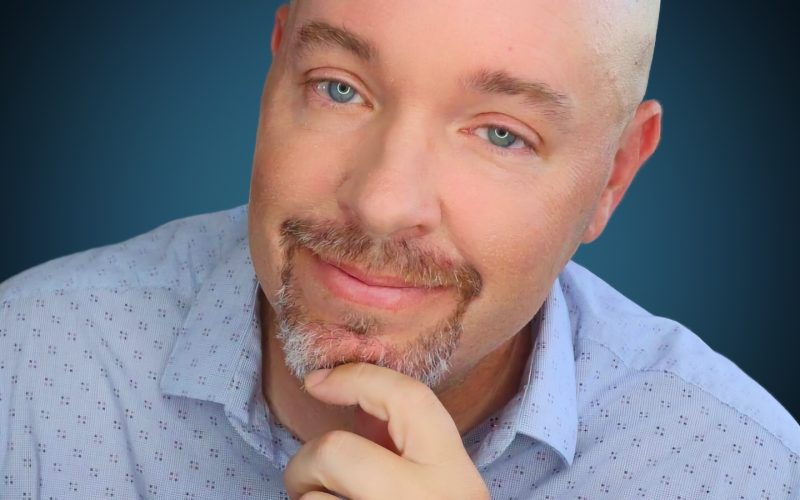We tend to think wealth is about numbers — compound interest, budgets, investment returns. But Dr. Brad Klontz wants to flip that script. In a raw, thoughtful conversation with YouPotential1 host Shaun Maslyk, the bestselling author and psychologist behind Start Thinking Rich, and 8 other books, makes a compelling case: the most important financial tool we have isn’t in our wallets — it’s in our heads.
What 20 Arrows Taught Him About Wealth
Klontz kicks off with a story that feels almost too simple — standing on a mountaintop with 20 brand-new arrows and feeling, for the first time in years, truly rich. It wasn’t the equipment itself. It was the memory it unearthed.
“When I was a kid, I had four arrows. Three were bent. I actually got good at compensating for them,” he says. That moment on the range wasn’t about archery — it was about how far he’d come. “I wasn’t worried about rent or bills. I had time, space, and freedom. That, to me, is rich.”
Maslyk chimes in, saying Klontz’s work helped him rethink his own scarcity patterns. “Your work gave me my version of arrows,” he says. “Mine are street hockey sticks.”
The Heart of Financial Psychology
So what exactly is financial psychology? Klontz explains it as simply as he can: “It’s about why we do what we do with money.”
He emphasizes that most people already know the basics — save more, spend less. “But knowing isn’t doing,” he says. “People are stuck not because they lack information, but because something deeper is pulling the strings.”
And those “strings” usually tie back to internal conflict — misalignment between what we truly value and how we behave financially. It’s a recipe for stress, self-judgment, and feeling stuck.
From Mess to Mission
Klontz didn’t launch a new academic discipline on purpose. He was just trying to make sense of his own financial wreckage. “I remember thinking, ‘Why would someone smart — me — do something so dumb with money?’” he laughs. His search for answers led him to realize there was almost no psychological research on money behavior. So he started doing it himself.
One early finding? People in helping professions — teachers, therapists, artists — often hold deeply self-limiting beliefs around money. “I studied it. It’s real,” he says.
Your Brain Wasn’t Built for This
Our brains, Klontz explains, evolved to survive in a tribal, short-term world. “You see the herd running west, you run west. That’s how you stayed alive,” he says. It’s the same instinct that tells us to panic-sell when markets drop or chase a hot trend when everyone else is.
And then there are the money beliefs — or “scripts” — we inherit without realizing. Things like: “Money is bad,” “Rich people are greedy,” or “There’s virtue in having less.” Klontz warns these internal narratives can sabotage even the best financial plans.
The Most Powerful Belief: “If They Can Do It, I Can Do It”
At just 12 years old, Klontz visited a friend’s house with two bathrooms — and that blew his mind. “That was rich to me,” he recalls. But instead of feeling envious, he got curious. “I spent dinner interviewing his dad. I wanted to know how he got there.”
That early moment planted the belief that would shape Klontz’s future: “If they can do it, I can do it.”
And he believes that belief is key. “If someone who shares your background made it, so can you. Find that person. Let that be your anchor.”
Rich Isn’t a Number. It’s a Mindset.
To Klontz, a “rich mindset” has little to do with income and everything to do with resilience, ownership, and growth. He points out that most millionaires have failed — and not just once. “They’ve had three major financial failures on average,” he says. “They try, they fall, they try again.”
That mindset — to see money skills as something you can learn — is a game changer. “Don’t say you’re bad with money,” he insists. “Say, ‘I have a lot to learn.’ It changes everything.”
Own It or Stay Stuck
Klontz is big on internal locus of control — the idea that you hold the power to change your life. Even when things go sideways.
“Someone stole from you? Sure. But what red flags did you miss? What role did you play?” he asks. “Blaming others might feel good in the moment, but it keeps you stuck. Owning your part — that’s where your power is.”
Generational Beliefs, Unpacked
Maslyk shares a revelation from Klontz’s course — an exercise writing a letter to his financial ancestors. It helped him trace his frugal tendencies back to family trauma and distrust of authority. “Once I understood that, the shame lifted. And I felt like I could finally choose differently,” he says.
Klontz agrees. “I traced my workaholism back three generations,” he says. “It’s wild how much of what we carry isn’t even ours. Once you see it, you can stop carrying it.”
What’s Truly Valuable? Time.
For Klontz, the richest person isn’t the one with the most stuff — it’s the one who owns their time. “Time is the most precious resource. That’s what I’ve spent the last 20 years trying to buy more of,” he says.
His financial goal has always been clear: “Freedom. Flexibility. To be able to go shoot arrows in the middle of the day — not because I’m wealthy in dollars, but because I have control over my life.”
Experiences > Stuff
When asked what message he’d leave for his grandchildren, Klontz doesn’t hesitate: “Experience > Stuff.”
He elaborates: “It’s the smell of your morning coffee. The moment of quiet. A deep connection with someone you love. That’s the real wealth.”
The Real Takeaway
Dr. Brad Klontz isn’t just a researcher. He’s a man who’s lived the mess, done the work, and built a roadmap for the rest of us. His advice isn’t just tactical — it’s transformational.
“If they can do it, I can do it,” he says again, this time directly to us. Maybe that’s the mindset shift we’ve been waiting for.
Footnotes:
1 "YouPotential Podcast." 3 July 2025.















